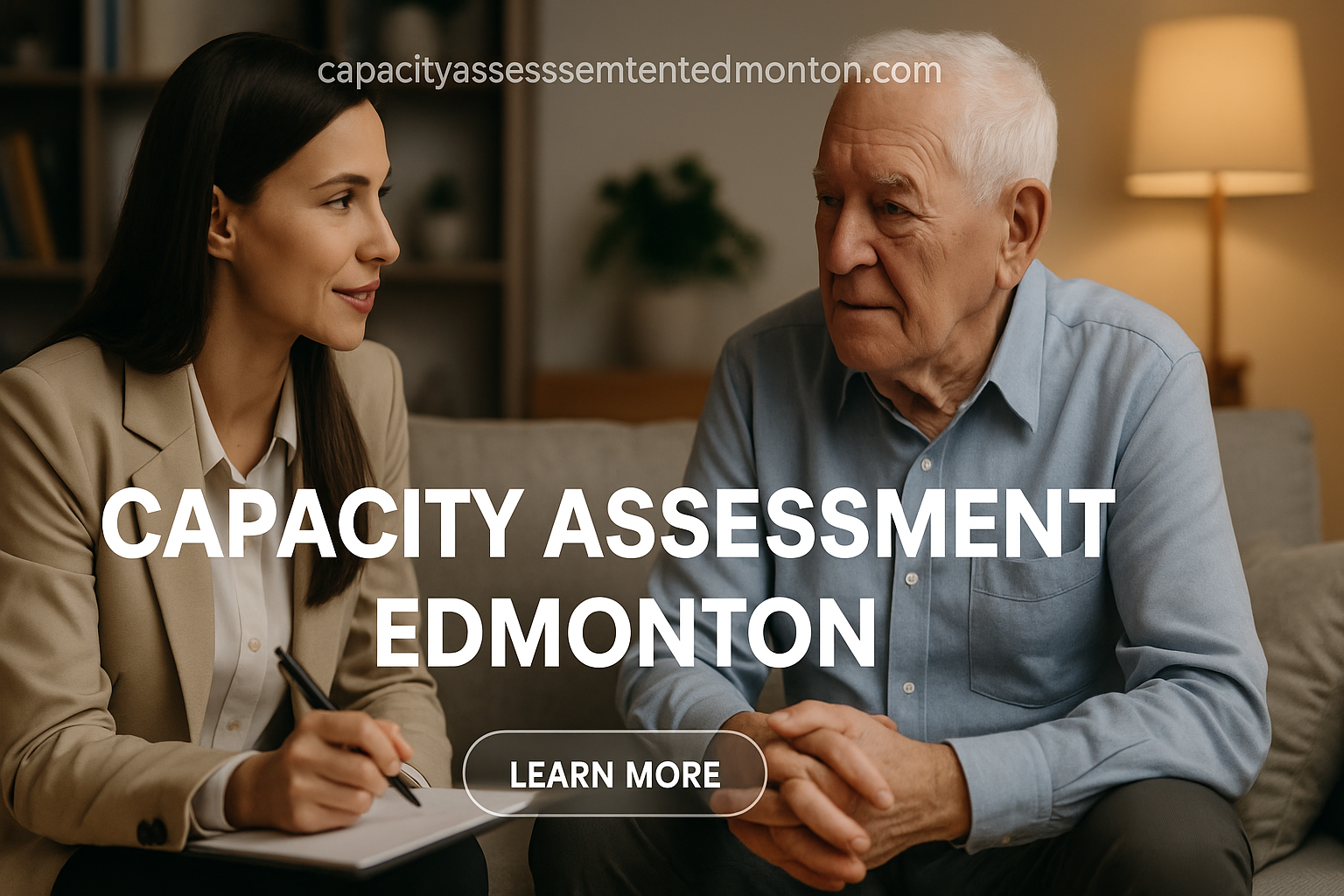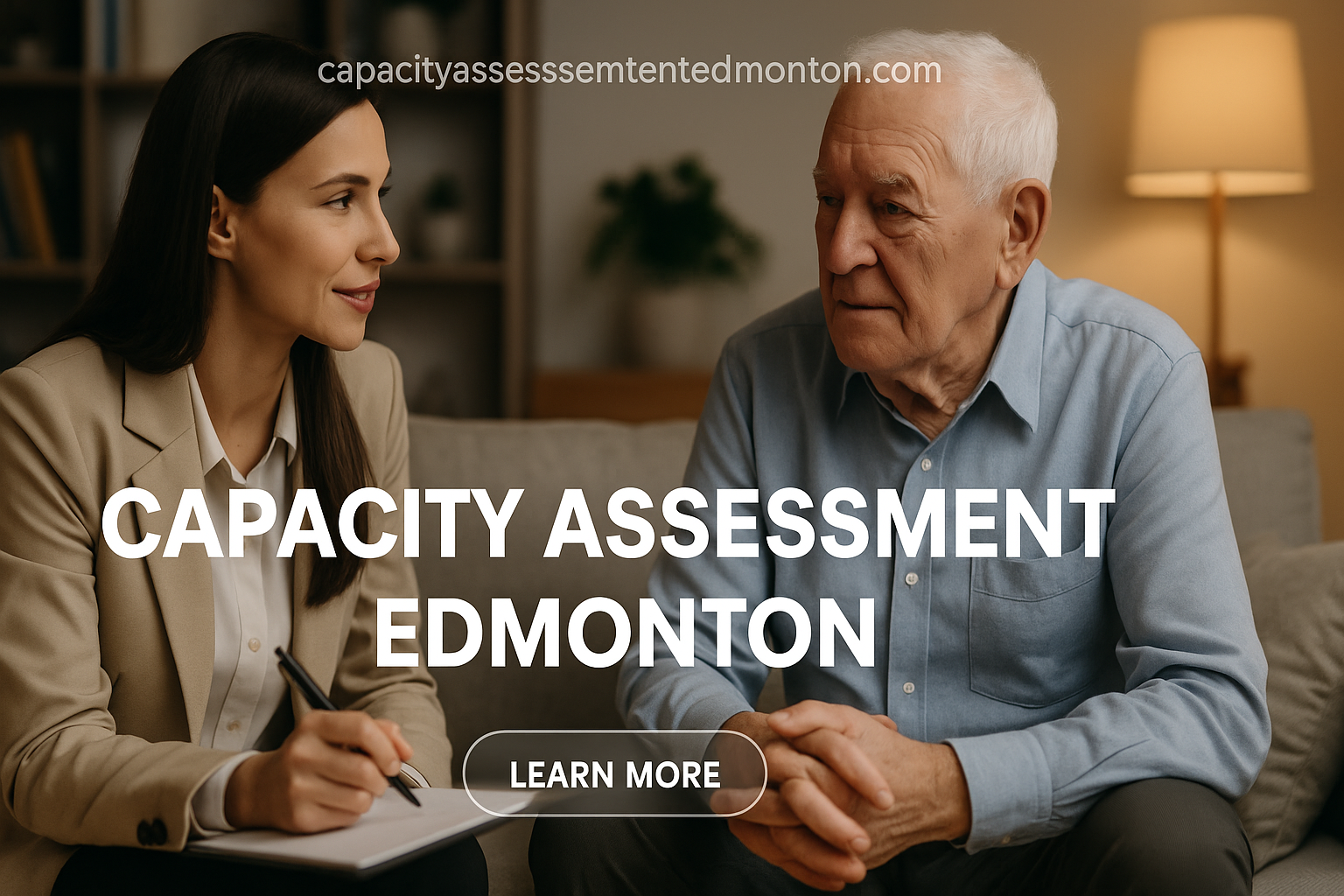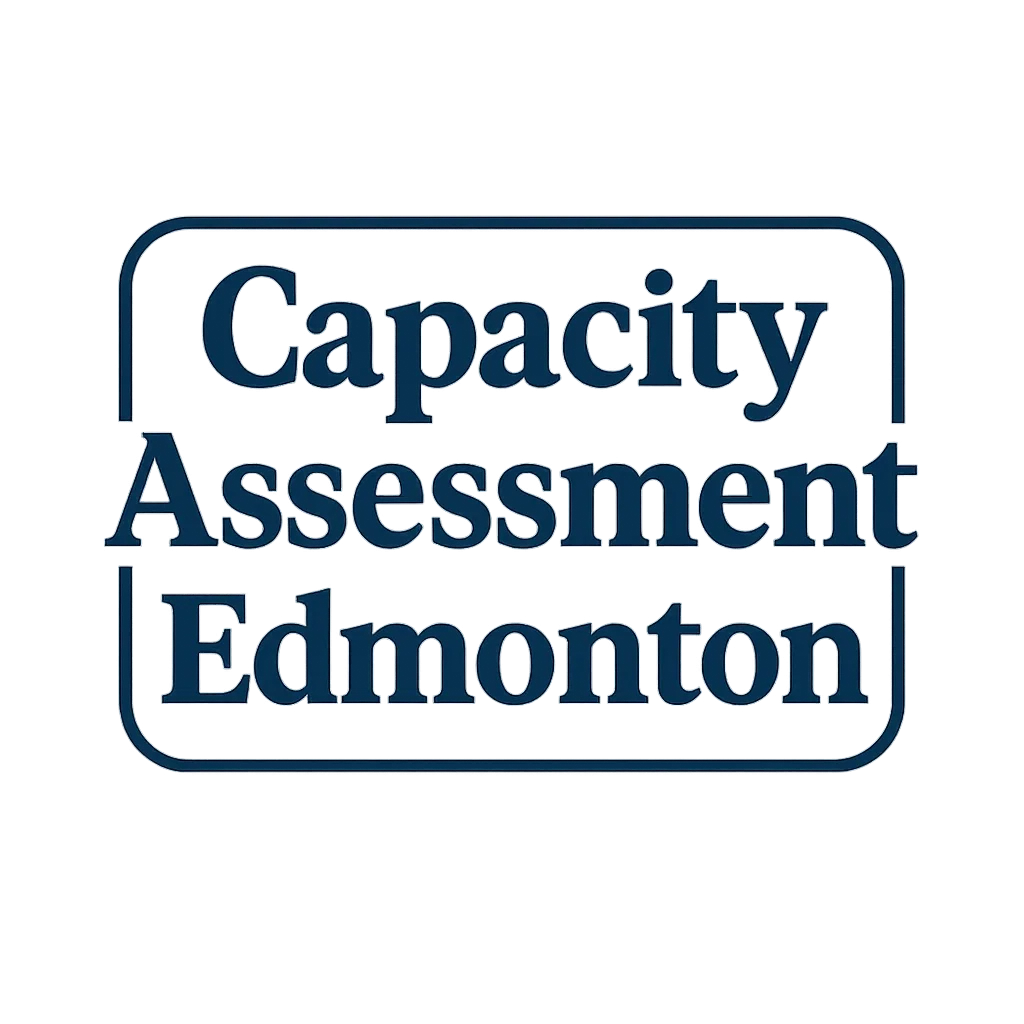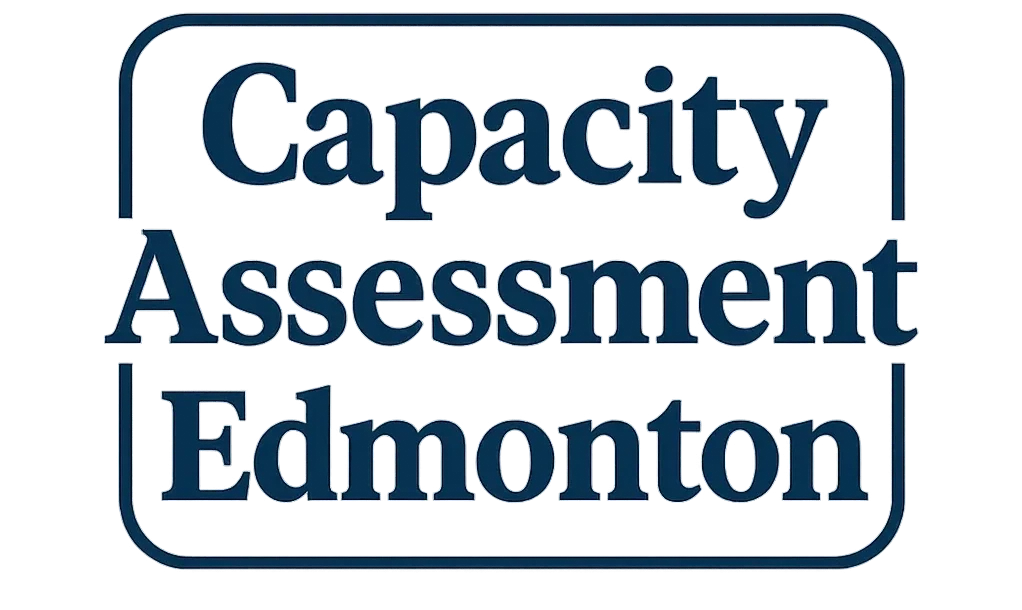Capacity Assessment Alberta
Capacity assessor near me
July 28, 2025

Capacity Unlocked: My Surprising Journey Through Alberta’s Assessment Maze

The first time I heard the phrase “capacity assessment,” I was at my aunt’s kitchen table, squinting at paperwork and clutching an over-steeped mug of tea. I thought it would be all medical jargon and checklists—until I realized it was really about dignity, choices, and ensuring the people I cared about got a fair shot at making big decisions. What I learned along the way, from scrambling for appointments to wrapping my head around fees and the weird comfort of online booking, might help you too. Let’s pull back the curtain on the real Alberta capacity assessment experience.
Capacity Assessments: The Alberta Way (And Why You’ll Be Surprised)
Let me tell you something that surprised me about Capacity Assessment Alberta – it’s nothing like the sterile, intimidating process I imagined. When my family first heard we needed one, I pictured endless forms and cold clinical rooms. What I discovered was completely different.
A Designated Capacity Assessor isn’t some distant bureaucrat. These are trained professionals who actually come to your home if needed. I met Sarah, a family in Edmonton, whose 78-year-old father needed assessment. The assessor sat at their kitchen table, chatting over coffee while observing how he managed daily tasks. It felt more like a thoughtful conversation than an exam.
Here’s what caught me off guard – Alberta’s approach under the Adult Guardianship and Trusteeship Act focuses on protecting rights, not just checking boxes. The assessment goes beyond medical tests. It includes interviews about daily living, personal preferences, and decision-making abilities. Research shows these comprehensive evaluations respect dignity while ensuring proper support.
“Capacity assessments aren’t just about paperwork—they’re about protecting dignity and supporting good decision-making.” – Dr. Janet Stewart
The flexibility amazed me most. You can book a Capacity Assessment Online Appointment now – something that seemed impossible just a few years ago. Virtual consultations are available, though in-home visits remain popular. For busy families juggling work and care responsibilities, this accessibility makes a real difference.
Understanding the different types helps too. Medical evaluations focus on cognitive abilities. Legal compliance assessments determine if someone can handle property decisions. Personal care capacity checks look at daily living skills. Each serves a specific purpose under the legislation.
Capacity Assessment Services Edmonton have evolved significantly. The process typically costs $500 for guardianship or co-decision making, $700 for combined guardianship and trusteeship. Travel costs might apply for home visits, but many families find the convenience worth it.
What struck me most was how assessors often provide recommendations beyond just pass-or-fail results. They help families understand options, suggest support services, and guide decisions about guardianship or trusteeship. It’s not about taking away independence – it’s about finding the right level of support.
The modern trends toward compassionate, flexible service delivery have transformed what used to be a dreaded process into something more manageable and human-centered.
The Nitty-Gritty: Breaking Down the Process (Confessions of a First-Timer)
When I first heard about the Capacity Assessment Process Edmonton, I pictured endless forms and sterile medical rooms. The reality? Much more human than I expected.
Pre-assessment: Surprisingly Simple
The pre-assessment step caught me off guard. Instead of drowning in paperwork, it felt like a thoughtful conversation. My assessor explained everything clearly, gathering basic information and ensuring I understood what lay ahead. No mountain of forms—just genuine dialogue about my situation and concerns.
Medical Evaluation: Myths vs Reality
I’d heard horror stories about grueling Psychological Evaluation Edmonton sessions. What I experienced was different. The medical evaluation focused on cognitive, emotional, and behavioral abilities through structured but respectful testing. Nothing felt invasive or overwhelming—just thorough and professional.
The Capacity Interview Experience
The formal capacity interview was surprisingly straightforward. My assessor walked me through questions about daily functioning and decision-making abilities. The structured approach actually made me feel more comfortable, knowing exactly what to expect at each step.
“Transparency in each step of the assessment is key for everyone’s peace of mind.” – Dr. Mona Reilly
Understanding the Capacity Assessment Report
The Capacity Assessment Report became the cornerstone of everything. This document captures all findings from the evaluation process, serving as essential documentation for any legal proceedings. Research shows that assessor’s documentation is crucial for both legal clarity and family understanding.
Navigating Legal Requirements
The Adult Guardianship Trusteeship Act sounds intimidating, but my assessor explained how Alberta’s regulations ensure fairness and consistency. The Functional Capacity Assessment follows strict guidelines, protecting everyone involved while maintaining legal compliance.
What Happens Next?
Who sees the results depends on your specific situation. The report might go to family members, legal representatives, or court officials—but always with proper consent and confidentiality measures in place. The regulated process ensures your rights remain protected throughout.
Looking back, the entire experience felt more supportive than clinical. Each step built logically on the previous one, creating a comprehensive picture while respecting my dignity and concerns.
The Real Costs: Dollars, Travel, and Unexpected Surprises
Let me be straight with you about capacity assessment fees in Alberta. When I first started researching this process, I was frustrated by vague pricing information. Everyone seemed to dance around the actual numbers.
Here’s what I discovered: standard fees typically run $500 for basic assessments covering either guardianship or trusteeship. If you need a combined assessment, expect to pay $700. These numbers aren’t hidden anymore—research shows that transparent fee structures are now more widely communicated across providers.
Understanding What’s Actually Included
The base fee covers the assessment itself, but here’s where it gets tricky. Travel costs for in-home visits vary based on distance from the assessor’s departure location. Some providers charge differently or offer bundled services, so you’re not always comparing apples to apples.
My advice? Get specific details upfront. When booking your capacity assessment appointment, ask exactly what’s included and what might trigger additional charges.
Getting Straight Answers Before You Commit
Online appointment scheduling has been a game-changer here. Many capacity assessment services Edmonton providers now offer clear fee breakdowns during the booking process. This helps avoid those awkward surprise conversations later.
“Families deserve transparency about assessment costs right from the start.” – Leah Chan
I couldn’t agree more with this sentiment. Online booking and up-front cost breakdowns really do help avoid surprises.
Budget-Friendly Alternatives
My thrifty cousin shared a useful tip: some assessors offer flexible payment arrangements or sliding scale fees based on financial circumstances. Don’t be embarrassed to ask—many providers understand that families face financial pressures during these situations.
Comparing Providers Across Alberta
When comparing fees across Edmonton and Alberta, I noticed pricing varies significantly. Some assessors bundle services, others charge separately for each component. The key is understanding exactly what you’re paying for.
Consider scheduling a capacity assessment online appointment to clarify costs upfront. Many providers now offer remote consultations to discuss pricing and services before you commit to the full assessment process.
The bottom line? Don’t let cost uncertainty add stress to an already challenging situation. Ask questions, compare options, and choose a provider who’s transparent about their fees from day one.
Booking Your Own Assessment: Your Options, Pitfalls, and a 2-Minute Hack
When I first needed to schedule my capacity assessment appointment, I thought it would be straightforward. Wrong. The booking process turned into a mini-adventure with unexpected twists.
Online vs. Phone: The Real Story
Everyone asks about booking online versus calling directly. Here’s what I discovered: it depends on your situation. Research shows that online portals reduce wait times for many clients, but phone calls sometimes get you faster answers about availability.
I initially tried calling three different offices. Two didn’t answer, and one put me on hold for twenty minutes. Then I found the capacity assessment online appointment option at capacityassessmentedmonton.com/capacity-assessment-appointment/. The difference was immediate.
My Booking Fumble (And What I Learned)
My first attempt was a disaster. I clicked through the online form without preparing my documents. Halfway through, I realized I needed specific medical information I didn’t have handy. Had to start over completely.
The second time, I came prepared. The whole process took under two minutes once I had everything ready.
“Technology has made booking easier, but having your paperwork ready still makes or breaks the process.” – Farrah Ellis
Getting Faster Slots: Myth-Busting
Here’s something interesting: I thought weekday appointments would be easier to get. Actually, many capacity assessment services Edmonton providers have more flexibility on certain weekdays than others. Tuesday through Thursday seem to be the sweet spots.
Appointment slots may fill weeks in advance, especially during high-demand periods. But cancellations happen regularly, so checking back frequently helps.
The 2-Minute Prep Hack
Before booking anything, gather these items:
- Your Alberta health card number
- Preferred appointment times (have 3-4 options ready)
- Contact information for your family doctor
- Any relevant medical documentation
Studies indicate that prepping documentation in advance is the best way to avoid booking bottlenecks. This simple preparation step transformed my frustrating experience into a smooth, quick process.
The online booking system worked better for me, but I know people who prefer calling. The key isn’t which method you choose – it’s being ready when you start.

Not All Assessments Are Created Equal: What Makes a Truly Great Capacity Evaluation?
After watching my aunt go through her capacity assessment evaluation, I learned something crucial: not every assessor approaches this process the same way. The difference between a good assessment and a great one often comes down to whether the assessor sees the person behind the paperwork.
The Patient-Centred Approach Makes All the Difference
My aunt’s first assessor rushed through questions like they were checking items off a grocery list. She felt like a problem to solve rather than a person with concerns. The second assessor? Completely different story. They sat down, made eye contact, and actually listened when she expressed her worries about losing independence.
Research shows that empathy and engagement by assessors ensure fairer, more useful results for families. This patient-centred approach doesn’t just make people feel better—it leads to more accurate evaluations of capacity assessment support needs.
When Assessors Listen vs. Just Fill Forms
You can spot the difference immediately. Some assessors engage beyond protocol, asking follow-up questions and taking time to understand context. Others stick rigidly to their forms, missing important nuances about someone’s daily functioning and decision-making abilities.
“Capacity assessment is about honouring humanity, not just measuring cognition.” – Dr. Rita Gomes
Laws Guide, But Empathy Wins Hearts
Yes, compliance with the Adult Guardianship and Trusteeship Act is mandatory. Every capacity assessment Alberta requires must follow these legal guidelines. But the best assessors understand that flexibility and humanity matter just as much as following procedures when evaluating capacity assessment legal guardianship needs.
Red Flags and Your Right to Ask Questions
Watch for assessors who:
- Rush through the evaluation
- Don’t explain their process clearly
- Seem dismissive of family concerns
- Won’t answer your questions about their findings
Families have every right to ask questions throughout the process. If something doesn’t feel right, speak up.
Getting a Second Opinion
Sometimes you need fresh eyes on the situation. If you’re uncomfortable with an assessment’s approach or findings, you can seek another evaluation. It’s not about shopping for the answer you want—it’s about ensuring thoroughness and fairness in such an important decision.
The human touch matters more than most people realize in these evaluations.
Trends You Didn’t Expect: In-Home Assessments and the Changing Face of Capacity Evaluation
When my aunt needed a capacity assessment in Alberta, I expected the sterile clinic environment I’d seen in movies. Instead, the assessor knocked on her front door at 2 PM on a Tuesday. This wasn’t unusual—research shows that in-home capacity assessments now comprise over 50% of new bookings in some Edmonton clinics.
The experience surprised me. My aunt sat in her favorite chair, surrounded by family photos and the familiar scent of her morning coffee. She answered questions more naturally than she ever would have in an office setting. As Sandra Ng notes,
“In-home assessment brings the process to where people feel safest—right at home.”
Why In-Home Assessments Are Growing
These capacity assessment trends make sense when you think about it. People perform better in familiar environments. There’s less travel stress, no parking hassles, and family members can be present without crowding a small office. The logistics work better too. Assessors can observe how someone navigates their actual living space, which provides valuable insights into daily functioning.
But it’s not perfect. Weather can complicate scheduling. Some homes lack the quiet space needed for focused interviews. And certain assessments still require specialized equipment only available in clinical settings.
Beyond Seniors: Unexpected Cases
Here’s what caught me off guard—capacity assessment isn’t just about aging. I’ve learned about young adults with traumatic brain injuries, people with developmental disabilities transitioning to independent living, and individuals recovering from strokes. The Capacity Assessment Services Edmonton landscape serves a much broader population than I initially understood.
Technology’s New Role
The booking process has changed dramatically. I scheduled my aunt’s assessment online through a simple form. No phone tag with receptionists. The assessor even conducted the initial screening by phone, which saved everyone time.
Some interviews now happen via video calls, though this depends on the complexity of the case. Technology streamlines the entire experience, from scheduling to report delivery.
These shifts toward home-based and tech-enabled evaluations clearly broaden access while improving client satisfaction. The traditional clinical model still has its place, but the field is adapting to meet people where they are—literally and figuratively.
Wild Card Round: The Questions Nobody Warns You About
Let me share something most guides skip entirely. What happens when the Capacity Assessment Decision Making process doesn’t go as expected? When I started this journey, I thought the report would be final. Wrong.
What If Someone Disagrees?
Here’s the reality – people disagree with assessment findings more often than you’d think. Family members might see different abilities than the assessor documented. Your lawyer might question specific conclusions. Even medical professionals sometimes have varying opinions on Capacity Assessment Support Needs.
The good news? Capacity Assessment Features Alberta include built-in safeguards. Legal reviews and hearings are available to resolve disputes. You can request a second assessment or challenge findings through proper channels. Research shows assessment outcomes can be re-examined if concerns arise, and ongoing dialogue is encouraged throughout the process.
Real Stories Matter
I met Sarah whose family was convinced her father could manage finances independently. The assessor disagreed. Instead of accepting defeat, they worked together to identify specific support strategies. The process revealed he needed help with complex decisions but could handle daily expenses just fine.
“Capacity is dynamic; it can change with circumstances. The best assessments account for that.” – Dr. Emily Chambers
A Fun Thought Experiment
Imagine if time travel existed. How would capacity be judged in 1920 versus today? Back then, women couldn’t vote in many places – was that about capacity or culture? The concept has evolved dramatically. What we consider “normal” decision-making ability reflects our current understanding and social values.
Why It’s Never Black and White
Capacity exists on a spectrum. Someone might excel at choosing their meals but struggle with Guardianship and Trusteeship decisions. The assessment process recognizes these nuances, which is why disputes happen – and why resolution processes exist.
The system acknowledges that assessment isn’t always absolute. Family, professional, and assessor opinions may diverge, but Alberta’s framework provides pathways to address these differences constructively.
If you’re facing questions about capacity assessment, remember that booking an appointment with qualified professionals can clarify your specific situation and available options.
Drawing It All Together: Finding Clarity, Empowering Decisions
After navigating Alberta’s capacity assessment system, I’ve come to understand something important. The quirks, the paperwork, the waiting periods – they’re all there for good reason. This system, despite feeling overwhelming at times, is ultimately designed to protect vulnerable individuals and their families during some of life’s most challenging moments.
What struck me most was how Capacity Assessment Alberta services focus on empowerment through transparency. When assessors take time to explain each step, when they answer endless questions with patience, when they make sure families understand the process – that’s not just good customer service. That’s the foundation of effective protection. Research shows that transparency and humanity are as vital as technical accuracy in assessment outcomes.
The peace of mind that comes from a thorough, empathetic assessment is remarkable. I watched families transition from anxiety to relief as they gained clarity about their loved one’s abilities and needs. The assessors didn’t just evaluate capacity; they provided a roadmap for moving forward with confidence.
“With every assessment, we help families write the next chapter—on their own terms.” – Dr. Alex Huang
These words capture something essential about Capacity Assessment Benefits Alberta. It’s not about limiting someone’s independence – it’s about ensuring they have the right support to maintain their dignity and make decisions within their abilities.
For anyone considering this path, here are my key takeaways. First, don’t wait until crisis hits. Early assessment can prevent difficult situations later. Second, choose your assessor carefully. Look for Capacity Assessment Services Edmonton that prioritize both technical expertise and human compassion.
The trends are encouraging too. Services are becoming more patient-centered, with flexible scheduling and streamlined logistics. In-home assessments reduce stress. Online booking makes appointments accessible.
If you’re facing this decision, remember that seeking assessment isn’t admitting defeat. It’s taking control. It’s ensuring your family has the information needed to make the best choices possible. The system exists to support you, not judge you.
Ready to take the next step? Book your appointment today. Your peace of mind is worth it.
TL;DR: Capacity assessment in Alberta isn’t just a formality—it’s a nuanced, step-by-step journey blending health, law, and real human stories. With expert assessors, in-home options, and online bookings, families can find clarity, legal guidance, and peace of mind—one appointment at a time.




